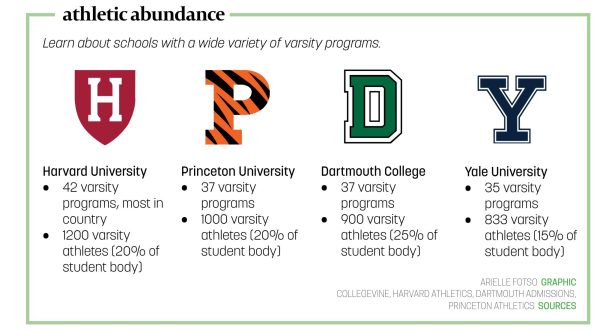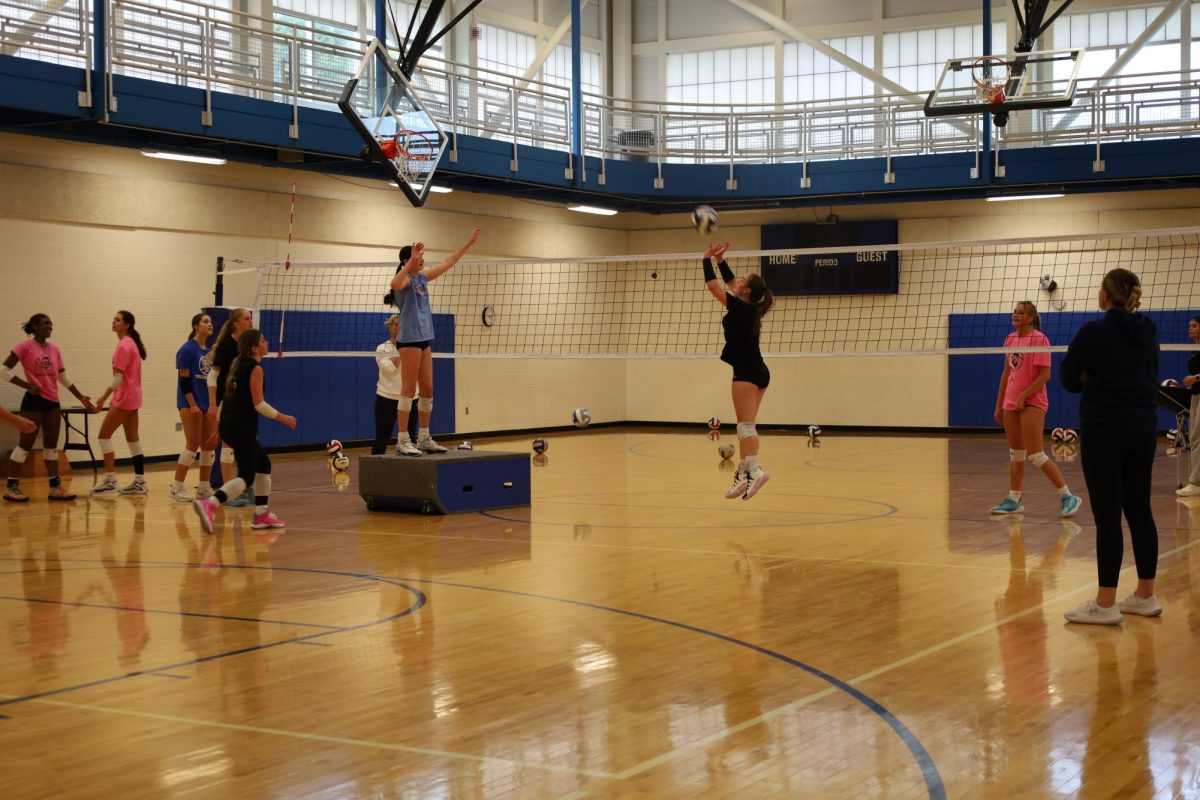When senior Amanda Ailes first began thinking about college, she had never heard of Huntington University, the school she is now committed to for volleyball. Next year, however, Ailes will be one of the 65,000 student-athletes competing at a National Association of Intercollegiate Athletics (NAIA) institution according to the NAIA.
Ailes said at first, she planned to attend IU like her older sister. However, her plans changed when she decided she wanted to continue playing volleyball in college.
“I always just thought I’d go to IU, but that wasn’t somewhere I could end up if I wanted to play volleyball in college,” Ailes said, “so it was kind of a shift with seeing that. I’ve always gone to all the football games and basketball games and seen all the students there and expected that would be me one day, and my sister goes there, so it was kind of an adjustment to realize that would never be my path. That was a bit of a difficult adjustment, but I’m really excited to be going to Huntington.”
Ailes said she appreciated the environment at Huntington and felt welcomed by the coach and team, so committing to Huntington over other, larger schools like IU where she couldn’t play volleyball made sense for her.
“I loved the coach, and I loved the program when I got there and I immediately fit in with all the girls. I got to play with them, and it flowed so well, and everything clicked on my visit,” Ailes said. “Everything just went so great.”
Many CHS students consider athletics when they are applying to college, according to Melinda Stephan, College and Career Counselor, but the decision isn’t always as easy for them as it was for Ailes.
“I would say pretty easily maybe a third of students, a quarter to a third are at least contemplating playing their sport and continuing that into college,” Stephan said, “And you know, I’d say there are at least a decent number that start thinking it and then in the end don’t, or the other way around, some think, you know I’m not going to. Then maybe something happens in their final senior session, they get an offer, and they’re like, ‘Oh maybe I really do.’”
This is what senior Ayla Abbasi is debating while she applies to college. Initially, she hadn’t planned to continue diving in college. However, during her ongoing senior season, she began wanting to dive in college.
“I’m on the fence about diving in college, because, I originally didn’t think that I wanted to,” Abbasi said, “and so now, like, my senior year I decided that I do, because I don’t really want to be done with the sport, because I enjoy it and I enjoy competing. So I want to keep doing that, but it’s also my senior year so I’m a little bit late to the recruiting scene.”

Abbasi said that some of the reasons she isn’t sure about whether or not she wants to dive have to do with balancing schoolwork and athletics.
“I know it’s hard to balance college athletics and schoolwork sometimes so that might be a drawback, just being able to manage time,” Abbasi said.
Ailes said that the other main factors influencing her decision to commit to Huntington were its proximity to home and that it is a Christian University. Ailes said that she is glad that after so many years of weekend volleyball tournaments interfering with her faith, Huntington’s ability to offer weekday services will help her feel more connected to it. Stephan said that many students considering athletics also grapple with other desires for their college life that can make it difficult to pick a school.
“Some students are like, I don’t want my sport to drive my search, but I would like to keep playing in college if I can, and others, sport is driving the search,” Stephan said, “and they are only applying to schools where they think they can play, or they’ve been provided offers.”
Stephan also said that one way students who are unsure about what school to commit to should try to stay open to all possibilities for as long as possible.
“Here’s the thing that happens at Carmel. It happens everywhere, but especially Carmel. People start getting decisions in December, January, February, and everyone’s wearing their college sweatshirts and everyone is freaking out because they think they should be making a decision too,” Stephan said. “It’s okay to wait until April or May to make a decision. If things are still playing out, maybe you’re a spring sport and you think you might be able to get some options in that spring semester. So (I’d say) apply to the schools you’re thinking about, because you still want to meet all those deadlines to be considered, but don’t feel like you have to decide just because everybody else is. There’s a lot of pressure with all the chatter and this is a big decision. It’s okay to take all the time you get to make that decision for sure.”
Abbasi is aiming to keep her options open by only applying to schools with diving programs, so no matter where she decides to go, there is a chance for her to dive in college.
“I made sure when I made my college list to only pick schools with diving programs. Even though some of their programs are too good for me to be able to dive at, I made sure that they have teams, so that if I decide I want to walk onto a team I would have that ability,” Abbasi said.
Ultimately, all three believe the decision is a personal one that students should carefully consider before deciding on a school. Many things, aside from sports, are relevant to the college decision. However, Ailes and Stephan both agree that sports can be a good way for students to discover what it is they actually want out of school aside from sports.
Ailes said, “Well, I mean with the school I committed to, I’m really happy with the coach and the program. I’m really excited to play with the girls that I met when I went for a visit, and so I think that will help me a lot to grow as a player and a teammate, to have this good support system there. I think (committing for volleyball) also helped me find a college that probably wouldn’t otherwise have been on my radar otherwise,” Ailes said. “It ended up just being the perfect fit with everything and I didn’t know about it before so I think that’s a huge benefit.”
“It kinda does depend on the student, for sure,” Stephan said. “I’ve seen both (types of students), where, you know, they don’t choose the school for the sport, but if they happen to be able to continue the sport at the schools that they like (they would want to), and then others find the school because of the sport, and then learn to love the school for all the other reasons.”

































![AI in films like "The Brutalist" is convenient, but shouldn’t take priority [opinion]](https://hilite.org/wp-content/uploads/2025/02/catherine-cover-1200x471.jpg)









































![Review: “The Immortal Soul Salvage Yard:” A criminally underrated poetry collection [MUSE]](https://hilite.org/wp-content/uploads/2025/03/71cju6TvqmL._AC_UF10001000_QL80_.jpg)
![Review: "Dog Man" is Unapologetically Chaotic [MUSE]](https://hilite.org/wp-content/uploads/2025/03/dogman-1200x700.jpg)
![Review: "Ne Zha 2": The WeChat family reunion I didn’t know I needed [MUSE]](https://hilite.org/wp-content/uploads/2025/03/unnamed-4.png)
![Review in Print: Maripaz Villar brings a delightfully unique style to the world of WEBTOON [MUSE]](https://hilite.org/wp-content/uploads/2023/12/maripazcover-1200x960.jpg)
![Review: “The Sword of Kaigen” is a masterpiece [MUSE]](https://hilite.org/wp-content/uploads/2023/11/Screenshot-2023-11-26-201051.png)
![Review: Gateron Oil Kings, great linear switches, okay price [MUSE]](https://hilite.org/wp-content/uploads/2023/11/Screenshot-2023-11-26-200553.png)
![Review: “A Haunting in Venice” is a significant improvement from other Agatha Christie adaptations [MUSE]](https://hilite.org/wp-content/uploads/2023/11/e7ee2938a6d422669771bce6d8088521.jpg)
![Review: A Thanksgiving story from elementary school, still just as interesting [MUSE]](https://hilite.org/wp-content/uploads/2023/11/Screenshot-2023-11-26-195514-987x1200.png)
![Review: "When I Fly Towards You", cute, uplifting youth drama [MUSE]](https://hilite.org/wp-content/uploads/2023/09/When-I-Fly-Towards-You-Chinese-drama.png)
![Postcards from Muse: Hawaii Travel Diary [MUSE]](https://hilite.org/wp-content/uploads/2023/09/My-project-1-1200x1200.jpg)
![Review: "Ladybug & Cat Noir: The Movie," departure from original show [MUSE]](https://hilite.org/wp-content/uploads/2023/09/Ladybug__Cat_Noir_-_The_Movie_poster.jpg)
![Review in Print: "Hidden Love" is the cute, uplifting drama everyone needs [MUSE]](https://hilite.org/wp-content/uploads/2023/09/hiddenlovecover-e1693597208225-1030x1200.png)
![Review in Print: "Heartstopper" is the heartwarming queer romance we all need [MUSE]](https://hilite.org/wp-content/uploads/2023/08/museheartstoppercover-1200x654.png)




